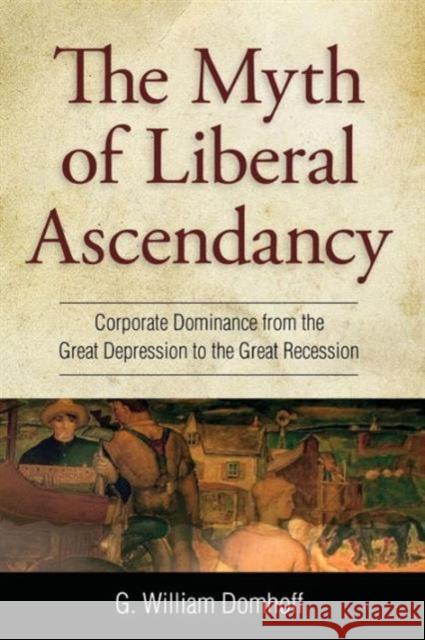Myth of Liberal Ascendancy: Corporate Dominance from the Great Depression to the Great Recession » książka
Myth of Liberal Ascendancy: Corporate Dominance from the Great Depression to the Great Recession
ISBN-13: 9781612052564 / Angielski / Miękka / 2013 / 320 str.
Myth of Liberal Ascendancy: Corporate Dominance from the Great Depression to the Great Recession
ISBN-13: 9781612052564 / Angielski / Miękka / 2013 / 320 str.
(netto: 170,78 VAT: 5%)
Najniższa cena z 30 dni: 176,25
ok. 22 dni roboczych
Bez gwarancji dostawy przed świętami
Darmowa dostawa!
It is commonly accepted that America saw the rise of liberalism in the wake of the New Deal, especially during the three decades after World War II. Based on new archival research, G. William Domhoff reveals this period instead as one of increasing corporate dominance in government affairs, affecting the fate of American workers up to the present day. While FDR's New Deal brought sweeping legislation, the tide turned quickly after 1938. From that year onward nearly every major new economic law passed by Congress showed the mark of corporate dominance. The influential Committee for Economic Development was a guiding force for presidential administrations and congressional leaders. Domhoff accessibly portrays documents of the Committee's vital influence in the halls of government, supported by his interviews with several of its key employees and trustees. In terms of economic influence, liberalism was on a long steady decline, despite two decades of post-war growing equality. Ironically, it was the successes of the civil rights, feminist, environmental, and gay-lesbian movements-not a new corporate mobilization-that led to the final defeat of the liberal-labor alliance after 1968. These cultural successes generated just enough backlash to turn whites toward the Republican Party. It then became possible for the corporate community to solve its emerging economic and political problems through the offshore manufacturing and high interest rates that killed off inflation and the power of unions.











